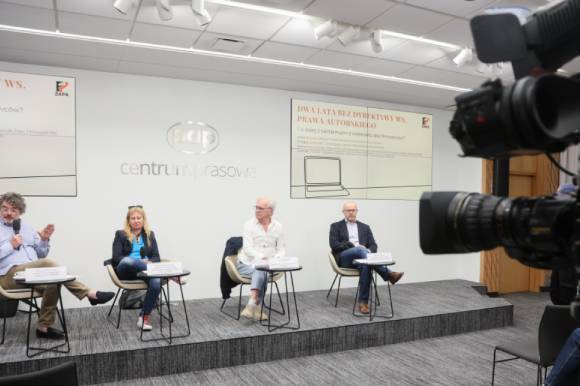“Film distribution has largely moved online. This change requires the implementation of the amendment to the EU Copyright Directive into Polish law. At the beginning, thanks to the Ministry of Culture and National Heritage, the activities went ahead, but for several months the government has been holding back, and Poland will soon be threatened with multi-million-dollar fines by the European Union”, Jacek Bromski said at the conference “Two years without the Copyright Directive. What next for Internet royalties for filmmakers?”, which took place on 6 June 2023.
The Union of Polish Audiovisual Producers ZAPA is responsible for a nationwide media campaign highlighting the issue and it has been tracking the whole legislation process that started in 2020, as well as the surrounding issues, on a special website http://www.tantiemyzinternetu.pl/.
Director, president of SFP-ZAPA and of the Polish Filmmakers Association, Jacek Bromski was joined at the conference by cinematographer and vice-president of the Society of Cinematographers PSC Karina Kleszczewska, screenwriter and member of the Board of the Polish Screenwriters Guild Grzegorz Łoszewski, and managing director of the Union of Audiovisual Authors and Producers Dominik Skoczek.
Jacek Bromski and Dominik Skoczek explained that The Act and the DSM Directives are a very important legal act for creators, which is intended to be implemented in the Polish law EU Directive 2019/790 of 17 April 2019 on copyright and related rights in the Digital Single Market (hereinafter "DSM Directive") regulating among others the issue of remuneration for the exploitation of films on the Internet.
Poland had to implement the directive until May 2021. It was among the six countries that did not do it yet, next to Denmark, Finland, Latvia, Portugal and Bulgaria.
However, the Ministry of Culture and National Heritage headed by Piotr Gliński was still working on the act implementing the EU regulations. The directive is a response of the European Union to the current challenges related to the development of digital technologies in the area of copyright, which changes the way how works are created, produced and exploited.
Currently, royalties are paid in accordance with Polish law by television stations, cinemas and DVD distributors. Streaming platforms are not yet covered by this obligation, which gives them an economic advantage over other distributors.
On 30 November 2022, Netflix, as the first and only streaming service in Poland, announced a pilot of an additional remuneration system for creators of popular local productions. “This is a programme based on solutions already successfully implemented in other European countries”, it was reported at the time.
“It is up to our government to decide whether Polish creators will share in these profits or whether they will remain only in the hands of an American corporation. The only guarantee of a fair distribution is the provision of adequate, proportionate and non-refundable remuneration for the exploitation of films on the Internet at the statutory level. Directors, screenwriters, actors and the entire film community are eagerly awaiting its implementation”, Jacek Bromski said in an official statement responding to these projects proposed by the streaming platform.
Currently, filmmakers are waiting for a meeting with PM Mateusz Morawiecki. On 14 June 2023 at 12:00, a protest of screenwriters and other creators will be held in front of the Chancellery of the PM in solidarity with American colleagues, but it is also imperative to raise the Polish problem that was discussed at the conference.
If the EU directive is not implemented into Polish law by September 2023, an indictment against the Polish government will be filed with the court regarding compensating the losses of creators from the moment of implementing the directive in the EU and the immediate regulation of the law in Poland.




















